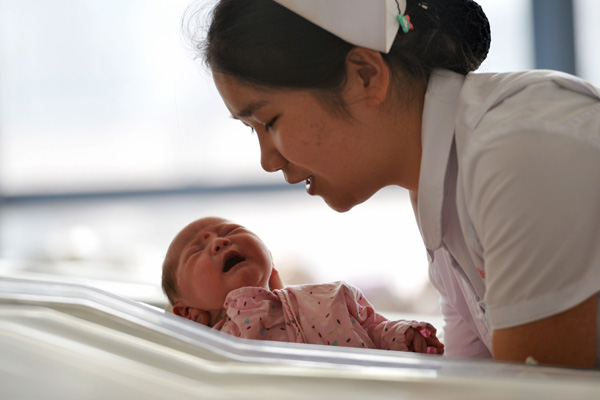Shanghai legislators propose measures to tackle birthrate decline

A nurse takes care of a newborn baby at Gansu Provincial Maternity and Childcare Hospital in Lanzhou. [Photo/Xinhua]
Legislators and political advisers in Shanghai are urging stronger support measures to increase people's willingness to have children, as the city's total fertility has dropped to a level severely lower than the internationally recognized standard.
Giving families with children, especially two or three offspring, higher tax allowances, providing enterprises better tax deduction support when they pay their part of women employees' social security while they are on maternity leave, and offering better and affordable infant and toddler care services before the kids reach kindergarten age are the main suggestions made during the ongoing annual sessions of the city's legislative and political advisory bodies, which will last through Saturday.
The latest Shanghai Health Commission data showed that Shanghai's total fertility rate was 0.7 in 2022, meaning that each couple had an average of 0.7 child, one of the lowest nationally.
It is recognized internationally that a couple needs to give birth to 2.1 children so that the population number of the next generation will equal that of the current. The figures for Singapore, Tokyo and Seoul are 1.12, 1.09 and 0.63 respectively.
Among Shanghai residents with children, 29.5 percent had two children and 4.5 percent had three. Those having a Shanghai hukou, or permanent residence, showed a lower desire for more children, with 24.3 percent having two offspring and 1.8 percent with three.
Local lawmaker Zhang Hua suggested families, especially women, with children be given a higher tax allowance for personal income, which should increase with the number of children.
"Every mother's dedication to their children ought to be better seen and recognized by society. Women bear a heavier burden between the roles in career and family than men," said Zhang, who is also chairwoman of the Shanghai Women's Federation.
Legislator Han Wei said that more policies will be unveiled to alleviate concerns for enterprises to recruit women of childbearing age, which will also make it more friendly for women in the job market.
"I found in my research that many small and micro-sized enterprises are reluctant to recruit young women, as such businesses are often sensitive to operating costs, weak in anti-risk ability, and have a small number of personnel," said Han, who is also chairwoman of Shanghai Qidi Entrepreneurship Incubator.
"So I suggested that enterprises with women employees on maternity leave or with a certain proportion of women employees of fertile age have tax privileges," she said.
Legislator Cai Jingjing said that the lack of a social support system for the care of infants and young children aged below 3, and the gap between the time children get off school and parents get off work, are still concerns for some to start a family.
She urged for more public, reliable resources with government subsidies to help parents take care of young children at lower costs.
- Top legislature schedules session for Wednesday
- China's top legislator meets with British PM
- China's top legislator holds talks with president of Senegalese National Assembly
- China's top legislator meets with Finnish PM
- Top legislator calls for advancing people's congress work in line with Party, State priorities



